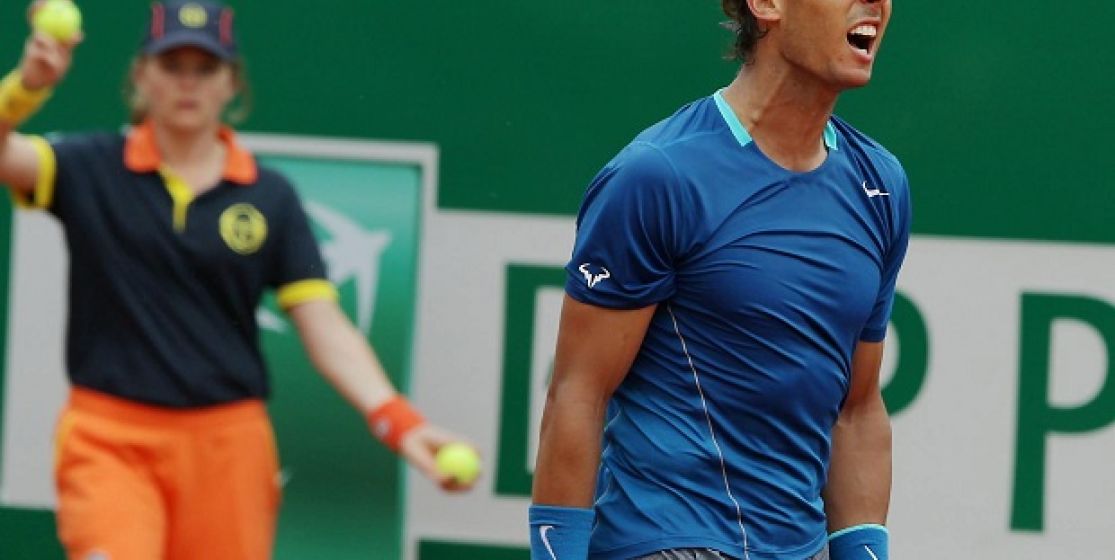"I might not arrive at Roland Garros as favourite,” said Rafael Nadal after his defeat in the quarterfinals of Barcelona’s tournament, after having already failed at the same stage of the competition in Monte-Carlo the previous week. Can he hope to win the French Open without having won on clay courts before? Difficult. In any case, it has rarely been the case in the past.
Eight-time winner of Roland Garros between 2005 and 2013, Rafael Nadal has always arrived in Paris after having won at least one Masters 1000 on clay courts. His favourite? The first of the calendar, Monte Carlo, to show the competition who’s the boss. Seven times out of eight, he came out victorious. With only a first hitch last year, when Novak Djokovic won against him in the final. He did catch up pretty well later by winning in Madrid and Rome, two tournaments he also loves. But it’s in 2010 that he’s been the more impressive by making the treble Monaco/Madrid/Rome before dominating Robin Söderling in Paris. It was only in 2009 that the ruthless reign of Rafael Nadal took a break, the time for Roger Federer to finally conquer Roland Garros’ clay. And again, the Swiss had already tasted victory weeks before the start of the Grand Slam by winning the first edition of the Madrid Masters on clay (replacing the German Open Hamburg). So, let’s summarize all this: over the last decade, every player who won Roland Garros, had already won a tournament on clay. And before that? Well, it’s a little bit more complicated.
Kuerten in 1997, an alien
In 2004, for example, just before Nadal started his Paris epic, it was Gaston Gaudio who won against his fellow Argentine Guillermo Coria. But Gaudio was 44th player in the world back then and had never won a Masters 1000 on clay court, not that year nor earlier (he actually didn’t win one in his entire career). His victory in Paris was therefore surprising since he only stood out one month before by reaching the final of Barcelona’s ATP 500 (which he lost against Tommy Robredo). But we have to remember that the 2004 edition of Roland Garros was particularly open, since no player had gained the upper hand from the beginning of the clay court season. A scenario somewhat similar to the one that took place two years before when the victory in Paris had gone to another big underdog, the Spanish player Albert Costa, who had not won a single tournament on the tour for three years! Stronger still, the first title of Gustavo Kuerten at the French Open in 1997 was also his first title on the ATP tour. The Brazilian was only ranked 66th worldwide then. Going back to the past two decades, three times, the Roland Garros winner had not won a single tournament on clay in the weeks before: Andre Agassi in 1999, Yevgeny Kafelnikov in 1996 (except for a minor tournament in Prague) and Sergi Bruguera in 1994, who had been defeated in Monte Carlo’s final (losing to Andrei Medvedev). Winner in 2003, Juan Carlos Ferrero had won Monte-Carlo before, as Gustavo Kuerten before his victory in 2001 and Carlos Moya in 1998. In 2000, Kuerten had won in Hamburg. As for Thomas Muster, he had won everything on clay courts in 1995: Monte Carlo, Rome, but also minor tournaments in Mexico, Estoril and Barcelona.
Djoko's year? Or the one of an outsider?
« Playing on clay courts requires a very specific preparation on the physical, technical and especially mental point of view, hence the importance of performing well from the start of the season at the tournaments preparing for Roland Garros, analyses the consultant Patrice Dominguez. A player needs confidence, patience and endurance. But above all, he must learn the best way to slide on this surface.» Therefore, Do Nadal’s poor beginnings on clay this season fatally weaken him? « One thing is for sure, he finds himself in a less ideal position because he seems less confident. He was unable to mark his opponents with a hot iron as he usually does.» admits Dominguez. The men's draw in Paris could then be more open than in previous years, with a young, fearless and uninhibited new generation. Players like Raonic, Nishikori or Dimitrov, "less marked by defeats" and less prone to the relentless domination of Nadal. But the most likely to benefit from the poor form of the Spaniard is of course Novak Djokovic, who has never won the French Grand Slam. To prove that he definitely has the resources, and without the ability to do it in Madrid, he will have to show in Rome an even higher level than in Monte Carlo a few weeks ago (he lost 5/7, 2/6 in the semi-finals against Federer). To be fitting with the statistics, it would be even better if he could win this tournament in order to arrive at Roland Garros in the best disposition to play to win...






